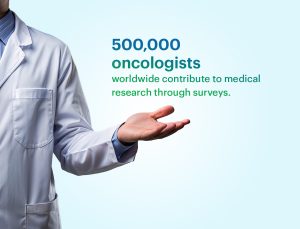Cancer remains one of the most challenging diseases to treat. According to the most recent reports from the International Agency for Research on Cancer (IARC), 20 million new cancer cases were diagnosed globally. Among them, there were 9.6 million cancer-related deaths. This data highlights the ever-present need for innovative therapies and improved patient outcomes.

The healthcare industry strives to meet this demand by placing more emphasis on medical research. A recent breakthrough in oncology is the development of the mRNA-based personalized cancer vaccine. It utilizes the same technology as the successful COVID-19 vaccines. This innovative therapy works by encoding specific antigens from the patient’s tumor into mRNA. It instructs the immune system to recognize and attack cancer cells based on the individual’s unique tumor markers. Early clinical trials show a 94% response rate for melanoma. Moreover, 63% of the patients show no disease progression after one year of receiving the personalized vaccine.
The success of such innovations underscores the importance of medical research and oncologists’ critical role in this endeavor by participating in paid oncology surveys.
PAID SURVEYS FOR ONCOLOGISTS: HOW THEY CONTRIBUTE TO CANCER RESEARCH

Oncology surveys play a crucial role in cancer research by providing a structured means of collecting valuable data from healthcare professionals. These surveys help researchers understand emerging trends in cancer treatment, evaluate the effectiveness of new therapies, and gather insights into patient outcomes. For instance, surveys can reveal how oncologists integrate new immunotherapies into their practice. They can also identify the challenges faced when treating specific cancer subtypes.
A notable example is the role oncology surveys played in developing targeted therapies. By collecting data on the genetic mutations observed in different cancer types, researchers could identify potential targets for new drugs. This led to the development of therapies targeting cancer cells with specific mutations, significantly improving treatment efficacy and patient survival rates.
ADVANCING ONCOLOGY RESEARCH: HOW YOUR PARTICIPATION CAN MAKE A DIFFERENCE
The insights gathered from paid surveys for oncologists are instrumental in shaping clinical guidelines, influencing policy changes, and driving innovation. For instance, surveys that collect data on the real-world effectiveness of new treatments can lead to updates in clinical practice guidelines. They ensure the latest evidence-based practices are adopted widely. Additionally, they can uncover disparities in treatment access or patient outcomes, prompting policymakers to address these issues and work towards equitable healthcare.
Several case studies have shown that survey participation can lead to significant advancements. One such example is the development of precision medicine approaches in oncology. By participating in surveys, oncologists provided data on genetic testing and patient responses to targeted therapies. It can contribute to the advancement of personalized treatment plans that improve patient outcomes.
BENEFITS OF PARTICIPATING IN PAID SURVEYS FOR ONCOLOGISTS
Participating in paid surveys for oncologists offers several direct benefits!
Firstly, medical surveys in oncology come with financial compensation. This additional income can be a significant incentive, especially for those in private practice or those looking to supplement their research funding.
Secondly, participation in paid surveys for oncologists can lead to professional recognition. Contributing to cutting-edge research and being part of a more significant scientific dialogue can enhance an oncologist’s reputation. Additionally, survey findings often get published in prestigious journals, providing participants with academic recognition.
Last but not least, oncologists can feel professional satisfaction when they know that their input is making a tangible difference in the field of oncology. By sharing their expertise through oncology surveys, they can help shape the future of cancer treatment and improve patient care on a broader scale.
HOW TO GET INVOLVED: EASY STEPS TO PARTICIPATE IN PAID SURVEYS FOR ONCOLOGISTS
Getting involved in paid surveys for oncologists is quite simple. Oncologists can start by joining reputable platforms that connect healthcare professionals with survey opportunities, like MDForLives. We offer numerous survey opportunities tailored to oncologists.
To take MDForLives’ oncology surveys, oncologists must register and complete the profiler, specifying their areas of expertise. Once registered, they will need to share their license for verification. After verification, they’ll receive invitations to participate in various paid surveys for oncologists. That’s all! Isn’t that easy?
Our oncology surveys usually involve answering questions about clinical experiences, treatment methods, and patient results. Each survey is quick to complete, making it easy to fit into a busy schedule and earn a steady passive income.
JOIN US TODAY – THE FUTURE OF CANCER RESEARCH IS IN YOUR HANDS
As the fight against cancer continues, the input of oncologists through oncology surveys remains invaluable.
By taking part in paid surveys for oncologists, they can help advance progress and improve patient care. The combined expertise and experiences of frontline heroes will shape the future of oncology.
If you are an oncologist who wishes to contribute to the ongoing oncology medical research, join MDForLives! You can also share your write-ups (case studies, blogs, and articles) with us at collaboration@mdforlives.com and earn up to $100!
REFERENCES:
- Increasing response rates from physicians in oncology research: a structured literature review and data from a recent physician survey
www.nature.com - The current and future role of the medical oncologist in the professional care for cancer patients: a position paper by the European Society for Medical Oncology (ESMO)
www.annalsofoncology.org - Role of Oncology Advanced Practitioners to Enhance Clinical Research
www.ncbi.nlm.nih.gov
A. Royden D’Souza is a professional writer with over 5 years of experience in the healthcare industry. He holds an engineering degree and has worked with several brands to meet their content requirements. He is passionate about writing engaging content for healthcare professionals, allied healthcare professionals, and nurses.





